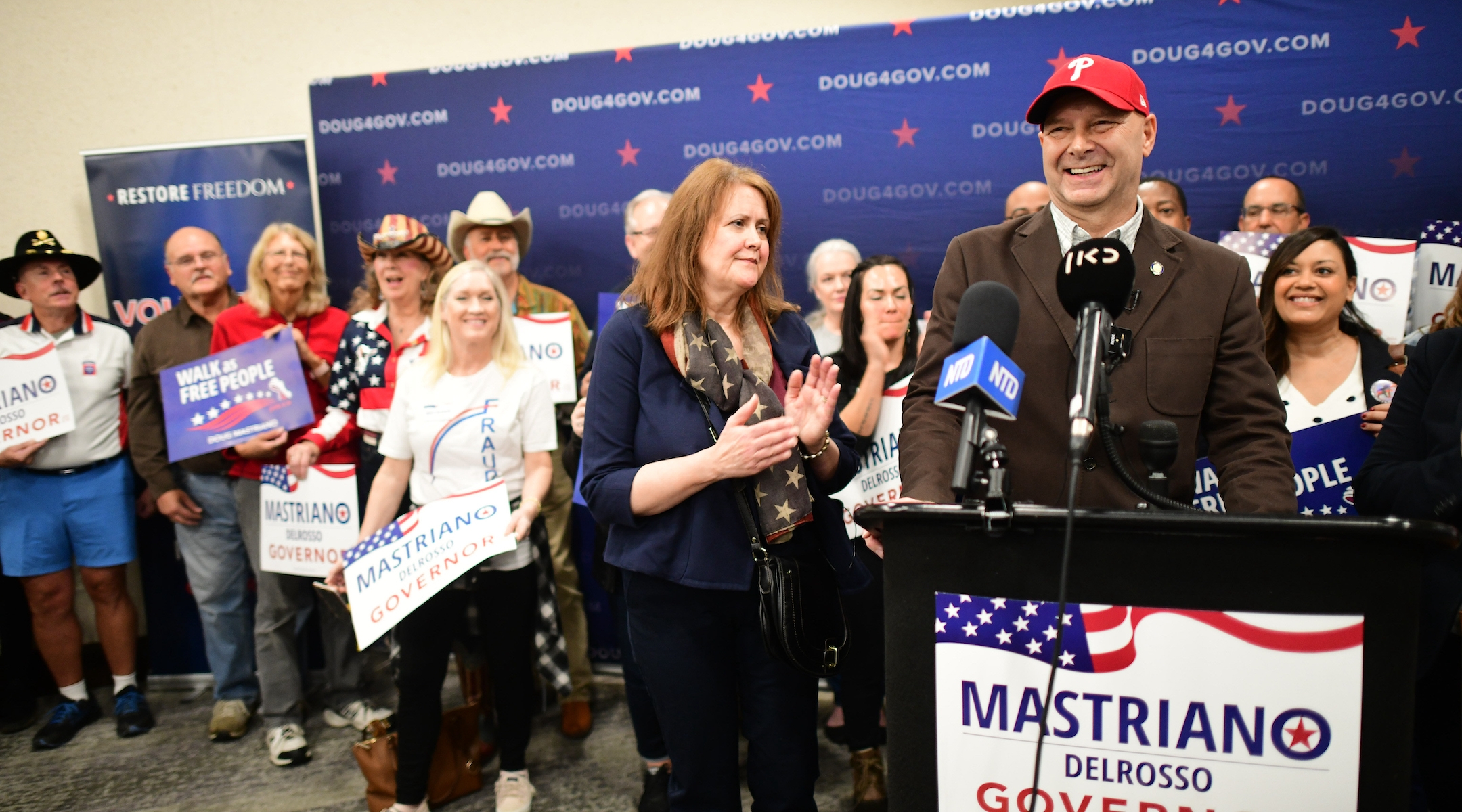How Doug Mastriano is embracing Messianic Judaism to deflect accusations of antisemitism
Blowing shofars at rallies and including blessings from Messianic rabbis, Christians are trying to define what it means to be a Jew

Doug Mastriano addresses the media as his wife Rebecca looks on during a rally in Manheim, Pa., Oct. 29, 2022. Photo by Mark Makela/Getty Images
Doug Mastriano, the Republican candidate for the Pennsylvania gubernatorial race, has never been shy about his Christian beliefs, which include support for Christian nationalism and an apostolic, prophetic theology. His views on Judaism, however, are less clear.
Mastriano has made numerous comments about his opponent’s Jewish practice and identity. Josh Shapiro, the Democratic candidate, is an observant Jew who sends his children to Jewish day school — one of many facets of his life and beliefs that Mastriano and his campaign have decried, with comments that often seem to be antisemitic dog whistles.
Yet Jenna Ellis, a senior advisor to Mastriano, also criticized Shapiro for not being Jewish enough, calling the candidate, who keeps kosher, “at best a secular Jew.”
Mastriano and his fellow far-right Christian nationalists have a soft spot for Judaism — or at least for something that approximates it. At Mastriano’s campaign announcement in August, he had a man in a tallit blow a shofar. During a rally the evening before Election Day, a woman played a guitar tribute to Mastriano to the tune of “If I Were a Rich Man” from “Fiddler on the Roof.” And at the same event, a man introduced as Rabbi Mitch Triestman blessed Mastriano in Hebrew.
Final day of campaigning in #PAGov: At a Mastriano rally in Bucks County, a woman on stage sings the Fiddler on the Roof soundtrack with lyrics full of praise for Mastriano
— Jacob Kornbluh (@jacobkornbluh) November 7, 2022
“We want you to be the governor. That’s what all the people pray.”
(h/t @Nadav_Eyal) pic.twitter.com/Tp7Q70vzZF
But none of these seemingly Jewish rituals had anything to do with Judaism, nor did they involve Jews. The preacher who blew the shofar, the woman who strummed the guitar and the so-called rabbi, who is not ordained and has authored books including “Abraham the Committed Christian,” are all adherents of Messianic Judaism, a Christian sect that co-opts Jewish tradition and ritual.
Messianic Judaism is distinctly Christian, given that it centers belief in Yeshua, which is the Hebrew name for Jesus. This makes its embrace easy for Christians like Mastriano, whose embrace with Christian nationalism leaves little room for supporting any religious practice that does not accept Jesus as the messiah.
Mastriano has pointed to his use of Jewish ritual as proof that he is not antisemitic after accusations began to fly due to his association with antisemitism-filled social media platform, Gab and its openly antisemitic founder Andrew Torba.
“We had a shofar, a prayer shawl,” Mastriano said in a Facebook livestream. “Like, make up your mind! You know, you have too much Jewishness in your events, now you’re antisemitic.” He went on to say that it was “bizarre” that he was being criticized for, as he put it, having “too much Jewish symbology.”
Many Jews, however, consider Messianic Judaism offensive and even antisemitic itself, given that Messianic congregations often seek to convert Jews.
Yet Mastriano and those close to him seem to feel that they have the authority to determine what makes a “good” or “real” Jew. His wife, Rebbeca Mastriano, recently responded to accusations of antisemitism by saying that “we probably love Israel more than a lot of Jews do.” And, of course, there’s that comment from his adviser, implying Shapiro is not religious enough to count as a real Jew — even though Shapiro keeps kosher, a commitment to religious observance many Jews do not take on.
It seems likely that Mastriano is defining Jewishness based on ideas that mesh with his own religious worldview and adherence — a worship style and belief in God that parallels his Christianity, simply with different garb. This is becoming an increasingly common trend among a certain strain of fundamentalist evangelicals like Mastriano, who seek out religious ritual that is closer to what they believe to be biblical observance in an attempt to enhance the perceived authenticity of their practice.
The framing of Jewish practice as good and bad echoes Christian rhetoric that criticizes Jews for not embracing Jesus as the messiah. Christians often point to passages in the Hebrew Bible that they read with a supersessionist bent to demonstrate that Jesus is the messiah Jewish texts predict. Jews’ refusal to accept Jesus as their messiah is framed as stubbornness — and flawed religious observance.
Mastriano is unlikely to win this race, but his headline-making beliefs about Jews are not likely to go away quite so easily. Blowing shofars and other gestures toward Jewish ritual have become increasingly common in alt-right spaces, including on Jan. 6 before demonstrators attacked the Capitol building. These gatherings that often include antisemitic conspiracies alongside conspiracy theories about the stolen election — a sign that loving Jewish ritual does not correllate to loving Jews, no matter what Mastriano might say.
Nevertheless, non-Jews are becoming increasingly emboldened to define what, exactly, makes someone a real Jew. Recently, defenders of Kanye West’s antisemitic statements have tried to quiet his critics by declaring that the rapper was out to get “non-religious Jewish power brokers,” not religious — and, implicitly, not real — Jews.
It’s unclear if Mastriano understands that his Messianic pastors are not Jews. Perhaps he missed the memo that belief in Jesus is a disqualifying factor.
























